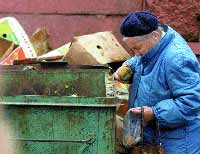Financial collapse may hit Russia already in 2008
Russia’s Finance Minister Aleksey Kudrin stated during his speech at the Economic Forum in Davos in January of this year that the Russian economy would become the example of stability for the upcoming years against the background of financial disasters in the world. However, specialists of the Russian Financial Academy do not share the optimistic sentiment of the minister. The Academy prepared a special report about the risks of the financial crisis in Russia.

The report describes five crisis scenarios. The financial collapse may hit Russia already this year, the document says. Director of the Institute of Financial Markets of the Financial Academy, Yakov Mirin, stated that risks for a financial crisis to occur became real in Russia in 2007-2008.
The authors of the report believe that if any of collapsing markets, in Latin America, for example, will start to experience significant problems, it will lead to the domino effect. Investors will start to get rid of third world’s securities. Specialists exemplify their point with 1998, when the collapse of the Brazilian market triggered the crash of the financial system in Russia.
The Russian financial system will experience problems if the foreign capital continues to flow out of Russia as it was seen in January and February of the current year. In addition, the Russian economy may burst like a soap bubble.
Specialists believe that the expansion of the list of strategic industries, where foreign investors are not allowed could be a dangerous trend for the Russian economy too. Russia’s strong dependence on crude oil prices plays an important role on the list of financial risks for the nation too.
The authors of the report believe that it would be nonsensical for them to analyze the financial situation in the world to try to predict oil prices for the period after 2010. However, they are certain that the reduction of crude oil prices from the current level of $111 per barrel down to $30-35 per barrel will destroy the Russian economy.
Outlines of a possible financial crisis started to show in Russia in 2007. The country managed to cope with the problems caused by the mortgage crisis in the USA. However, it does not mean that the nation will be able to cope with other critical phenomena.
Some experts say that a crisis would play a positive role for Russia. “We begin to realize that we should not live at the expense of external resources only. The Central Bank and the government admit that one has to bring internal resource back into the circulation,” the head of the Association of Russian Banks, Garegin Tosulyan says.
The Russian financial crisis (also called "Ruble crisis") hit Russia in August 17 1998. It was exacerbated by the global recession of 1998, which started with the Asian financial crisis in July 1997. Given the ensuing decline in world commodity prices, countries heavily dependent on the export of raw materials, such as oil, were among those most severely hit. (Petroleum, natural gas, metals, and timber accounted for more than 80 percent of Russian exports, leaving the country vulnerable to swings in world prices. Oil was also a major source of government tax revenue.) The sharp decline in the price of oil had severe consequences for Russia. However, the primary cause of the Russian Financial Crisis was not the fall of oil prices directly, but the result of non-payment of taxes by the energy and manufacturing industries.
Photo by: globalsecurity.org
Translated by Dmitry Sudakov
Pravda.ru
Subscribe to Pravda.Ru Telegram channel, Facebook, RSS!




